In the rapidly evolving world of commercial landscaping, the integration of virtual plant care is revolutionizing how we maintain and monitor green spaces. This innovative approach leverages advanced technology to ensure the health and vibrancy of plants, offering numerous benefits over traditional methods. Let’s explore the concept of virtual plant care, its underlying technology, and its impact on commercial landscaping, with specific examples from IslandEarth Landscape Company in British Columbia.
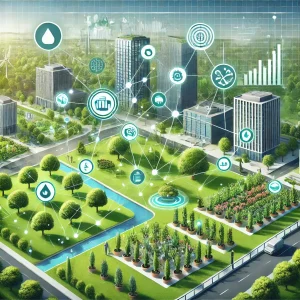
Definition and Overview of Virtual Plant Care
Virtual plant care refers to using technology to monitor and maintain plants remotely. This can include sensors, software, and automated systems that track plant health, soil conditions, and environmental factors in real time. Landscapers can use these tools to ensure optimal growing conditions and address issues before they become critical.
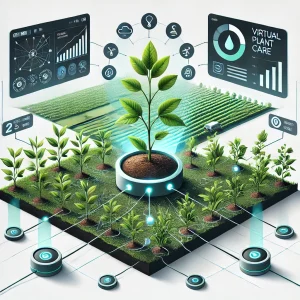
The Technology Behind Remote Monitoring and Maintenance
The backbone of virtual plant care lies in its technology. Sensors placed in the soil and around plants collect moisture levels, temperature, light exposure, and nutrient content data. This information is then transmitted to a central system where specialized software analyzes it. Landscapers receive real-time updates and alerts, allowing them to make informed decisions about watering, fertilizing, and other care activities.
For example, IslandEarth Landscape Company utilizes a suite of sensors and software to manage its projects across British Columbia. It employs soil moisture sensors and weather-adaptive irrigation systems to maintain optimal soil conditions, ensuring plants receive the right amount of water based on current weather patterns.

Benefits for Commercial Landscaping
The benefits of virtual plant care for commercial landscaping are substantial:
- Cost Savings: Automated systems reduce the need for manual labour and prevent overwatering, saving on water bills.
- Efficiency: Real-time data allows for precise care, reducing waste and improving resource management.
- Improved Plant Health: Early detection of pest infestations or nutrient deficiencies leads to healthier plants and more vibrant landscapes.
IslandEarth Landscape Company has improved efficiency and plant health by implementing virtual plant care. Their remote monitoring systems in office parks and shopping centers have reduced water usage and lower maintenance costs.
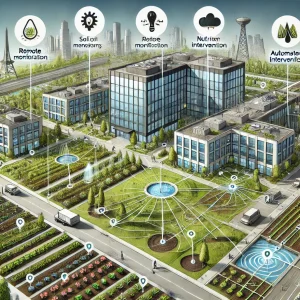
Real-World Applications and Examples
IslandEarth Landscape Company has successfully implemented virtual plant care in several high-profile projects:
- Office Parks: In a large office park in Vancouver, IslandEarth installed a network of soil sensors and automated irrigation systems. The real-time data allowed them to maintain lush, green lawns and healthy plants despite fluctuating weather conditions.
- Shopping Centers: At a significant shopping center in Victoria, British Columbia, IslandEarth used remote monitoring to manage extensive flower beds and greenery. The system detected a nutrient deficiency early, enabling timely intervention that saved the plants from potential damage.
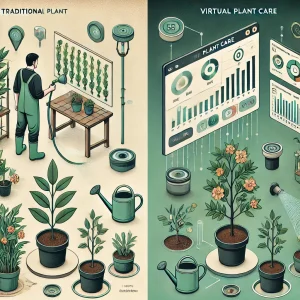
Comparison with Traditional Plant Care Methods
Traditional plant care relies heavily on manual inspections and guesswork. Landscapers would assess plant health visually and make care decisions based on experience and intuition. This approach, while effective, is time-consuming and often less precise.
In contrast, virtual plant care provides precise, data-driven insights. Automated systems can continuously monitor plant conditions, offering precision and efficiency unattainable through traditional methods. For example, IslandEarth’s moisture sensors ensure that plants are watered only when necessary, preventing under- and over-watering.
Challenges and Potential Drawbacks
Despite its advantages, virtual plant care is challenging. Initial setup costs for sensors and software can be high, and a learning curve is associated with using new technology. Additionally, reliable internet connectivity is crucial for real-time monitoring, which can be a limitation in remote areas.
IslandEarth Landscape Company has addressed these challenges by offering tailored solutions that fit the specific needs and budgets of its clients. It also provides training and support to ensure seamless technology integration.
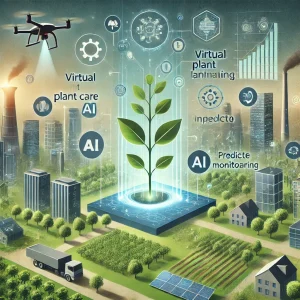
Future Trends and Advancements
The future of virtual plant care is promising, with advancements in AI and machine learning poised to enhance its capabilities further. Predictive analytics could allow systems to anticipate and prevent issues before they arise. Integration with other smart technologies, such as drones for aerial monitoring, could offer even more comprehensive care solutions.
IslandEarth Landscape Company is at the forefront of these trends, continually exploring new technologies to enhance its services. Its commitment to innovation ensures it remains a leader in the field of commercial landscaping in British Columbia.
Virtual plant care is transforming the commercial landscaping landscape, offering a more efficient, cost-effective, and precise approach to plant maintenance. With real-world applications and success stories from companies like IslandEarth Landscape Company, it’s clear that this technology is set to become a staple in modern landscaping practices. As advancements continue, the potential for even more significant plant care and sustainability improvements is immense.